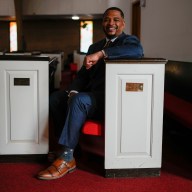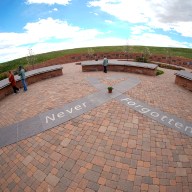 The Polyphonic Spree play Brighton Music Hall in Allston on Aug. 25, Brooklyn Bowl in Brooklyn on Aug. 26 and Prince Music Theater in Philly on Aug 27.
The Polyphonic Spree play Brighton Music Hall in Allston on Aug. 25, Brooklyn Bowl in Brooklyn on Aug. 26 and Prince Music Theater in Philly on Aug 27.
For the past 14 years, the Polyphonic Spree have been known for packing as many members as possible onto stages and creating music as jubilant and colorful as the uniforms the members don. The songs on last year’s “Yes, It’s True” album stayed true to that recipe, so it’s surprising that there are moments on their brand new album, “Psychphonic,” that sound a bit darker. It’s especially surprising when one considers that every single song is from the “Yes, It’s True” album, but remixed by different DJs.
Detached from the spectrum of the Spree’s ornate instrumentation and placed on different backgrounds, the vocals of leader Time DeLaughter are more raw, the cold electronics on a song like “Carefully Try” bring out a desperation not as detectable on the original recording.
“I knew once we gave the tracks to capable engineers who are DJs that they were going to go crazy with it,” says DeLaughter. “I knew they were going to turn it into something that you just wouldn’t imagine was there.”
We reach DeLaughter at his home in Texas, while he’s engaged in what he refers to as his “domestic duties” in a two-week break in his band’s latest tour.
Who from your family tours with the group currently? Does your wife still come out?
No, she’s pretty much with the kids. They’ll come out sometimes if it’s not interfering with their social lives. They’d much rather do that then come out there, but it’s just myself and then the kids might come out one by one, depending if it works for them or not. My daughter is 15, and she’ll be 16 in November, my son Oscar is 14, my son Julius is 13 and Felix is 7.
Are they introducing you to new music yet?
Not really. I try to introduce them to music and keep them from being infiltrated by the bullshit that’s out there. But my son’s a songwriter and he definitely introduces some of his ways of writing songs, which is somewhat refreshing.
It’s interesting that people who have been making music for as long as you have, and really got their start in the 1990s, their children are now at the age where they’re able to hold their own onstage. Jeff Tweedy’s son is playing drums with him now.
Yeah, and it’s weird because we’ve always had instruments around the house and my kids have grown up with music around them, especially with being on tour at such a young age, but we’ve never forced them or been like, “hey, you need to take these piano lessons”or take guitar lessons. We’ve just kind of let them discover it and self-teach themselves, and it’s been kind of cool to see how unorthodox their songwriting skills are or their skills on the guitar or piano. That part is always really interesting to me because I was the same way. And it makes for so much more of an interesting perspective when you’re self-taught. So that’s been kind of cool to realize and watch that. We get out there and jam from time to time, but really it’s not as connected with them and me as you might think. I don’t really engage in it with them that much and they don’t really engage with me that much. It’s just that sometimes we do it. But I could definitely see in the future where we’d be looking at each other as peers, like, “Hey, could you help me out with this?”
What do you mean you don’t engage with them? Are you talking musically or are you saying that you ignore them entirely when you’re both around the house?
[Laughs.] No, I don’t engage with them musically. I mean, I play with them, don’t get me wrong, but I’m not like what you would think; this father that plays music and pushes his ideals and his ideas on his kids. They pretty much do their own thing.
I think about a father who pushes sports onto his kids, but have never thought about a father pushing music on his kids.
Well, that’s it exactly. They’re around that kind of stuff and I see these dads that are so engaged with their kids in sports, and it’s great and all that, but it seems like they tend to push their agenda on them and really kind of like hope that they’re getting what they can for themselves through their kids. It’s not like that for me. I could care less if they play music. To be honest, I’d kind of hoped they wouldn’t get involved with it, but I think I’m shit out of luck with that. Two of them are really into it.
Tell me about the “Psychphonic” album and how it came about that every song from your “Yes , It’s True” album came to be remixed.
Most of the time when people do remixes they’ll just pick a couple of their songs or they’ll pick a single and go off and get it remixed by somebody, and we had different people from all over the world make videos for us; we reached out to fans of the band to make videos. And there was one person who was also a DJ and really well-connected with other DJs and he kind of came up with the idea with my wife, like, “Hey, I’d like to do some remixes and I’ve got some friends who would like to do the same for you guys.” And we said, “Hey, let’s just check a couple of them out,” and we did and then it was, “Would you mind if I gave this other one to another friend?” and he did and before we knew it we had every song remixed by 10 different DJs. And we got them all back and were like, “Wow!” I mean, it’s a totally reinterpreted record. And we actually had nothing to do with it other than giving them the stems and the tracks to be able to do what they wanted to do, but if they wanted to re-imagine it, it was their opportunity to really go for it. We were really trusting with it. So we got together with Kirtland [the Dallas label that had put out the Spree’s previous two albums] to see if they wanted to put it out. Because we really liked it. It was another way to see “Yes, It’s True,” and for us it was an opportunity to really enjoy our songs in a completely different way. And we just thought fans would get a kick out of it.
Are you playing any of these remixed versions live?
No. It’s really so electronic and heavy into the DJ realm. It’s not our bag. We do have each DJ if they’re ever in the particular city we’re playing come out and play as one of the acts on the show, and we had that happen on the first leg of the tour. We had four of them come out and spin songs before and actually play the songs that they did. So you’ll see them if they happen to be in your town.
What have you learned from all of this? Anything you didn’t know about yourself and the way you make music?
It’s weird. Some of the DJs use some of the tracks, but some of them basically went off and wrote their own parts over it and completely reinterpreted the songs. Some of them kept the vocals, some of them flipped the vocal around, some of them autotuned the vocals. I knew once we gave the tracks to capable engineers who are DJs that they were going to go crazy with it. I knew they were going to turn it into something that you just wouldn’t imagine was there.
Any particular reason that you only decided to draw from “Yes, It’s True”? Or was it just that it happened that way?
Well, it does help support the record that we’ve got out there and keep the steam going on as well. I hate saying it, but times are hard right now. But we’re proud of the record and it’s a good record. But there’s only so much that you can do these days and we’re doing everything we can, and we just thought, “Wow, this is a completely different perspective on our record,” and it’s kind of nice to have this as a piggyback. Polyphonic Spree have always had a strong presence in the DJ world from the get-go, because there’s so much instrumentation that they could pull from and sample, and they’ve been doing it for years with Polyphonic Spree and it made sense for that reason as well, since Polyphonic Spree’s always been friendly in the EDM world. It’s kind of cool and it make sense for us to put a record out like this because we’ve been dabbling in this for years and people have been using our tracks for years, so it’s cool that Kirtland was willing to put a record out like that. But it’s not like it’s going to be this huge moneymaker. It’s just nice for fans and for our core audience that sometimes gets neglected.
You mentioned times being hard. I saw that on your site you have a button to just PayPal you guys some money for tour support. Does that kind of appeal to fans go a long way to subsidize you?
No, I mean, we did that because people that are fans of the band are aware of what it takes for us to do what we do. C’mon, man, we get paid like a four-piece band, but we have four bands in our band.
How many people is it on this tour?
I think we have onstage 17. And that’s pretty light for us. All of the basics are covered though, and we’re killing it! The band is the best it’s ever been. But what started that whole thing was that people would just come up to the merch booth and just give us money, and say, “We’d just like to donate to the cause.” And we started thinking, “Hey, why don’t we make it easier for them” and it’s not like we’re making all of this crazy money. Polyphonic Spree is a labor of love, but it’s also a financial insanity. It just doesn’t work out on paper, but we’ve been able to keep it going for 14 years with doing other things that subsidize it. We’ll license songs and people will use our songs in movies and commercials and whatever. That’s how we’ve been able to make it thus far and we did the Kickstarter thing for this last record, for “Yes, It’s True” and that was the first time we embraced that. You know, we have to use all of the resources in the modern age for us to be able to continue because unfortunately record sales have never been a strong suit for us because we’re not all over commercial radio. We’re a large touring band and there’s a financial reality to that. It is what it is, so you have to be like, “Wow, so we can put a ‘donate’ button on our website,” so hell yeah, let’s do that if people wanna give us money. It’s like $5 here or $10 there, but every little bit helps.
You talk about this reality, which is a struggle, but the music of the Polyphonic Spree is such a removal from reality. I’d imagine it’s hard to maintain both mindsets, since they’re so opposite of one another.
At the end of the day it’s art, and it’s always been art, but c’mon, I have a family. I’ve got four kids, a wife, a house, I’ve got to balance what we need to flourish as human beings, my wife and I, and at the same time try to finance this thing and not let it interrupt your artistic flow and dictate what kind of music you’re going to play and how many people you’re going to have in your band and how it’s going to describe your sound. That’s the one thing that I can say I’m pretty proud of: We’ve always maintained the integrity of the size of the Polyphonic Spree, the sound, the justification of the sound and it’s been there from the very beginning and it’s been on every record. And we’re still touring to this day, and it’s not because it hasn’t been a lot of work. And it’s not because we haven’t been through financial hard times. All of those things have played into it and it’s so appropriate for the Polyphonic Spree. It’s just the nature of this band. It’ll come out one day what it’s taken for us to be able to continue what it is we do. Hell, we’ve lasted longer than four-piece bands that started in 2000. We created a sound at a time when no one was doing that particular sound, and now you can find it everywhere. I’m pretty proud of what we’ve done, but it’s still a struggle and [laughs] it seems like it’s always going to be a struggle. We always thought it was going to get a little bit easier, but it hasn’t. But it’s always a blast.
You mentioned that you’ve lasted longer than a lot of four-piece bands, and even your previous band, Tripping Daisy, that lasted about 9 years. That must have blown your mind when you reached that point where your enormous band outlasts your previous band.
Yeah, it did. For something that I never thought would be a touring band, and for something that in its infancy stage I thought of as an experiment, for me to be having a conversation with you about a band I’ve been in for 14 years like the Polyphonic Spree, that’s mind-blowing. It was never supposed to work. Everyone thought it was a gimmick. Everyone thought, “Oh, this is really good, Tim, but you know you’re not going to be able to tour this. Man, it’s a great idea, bro, but you know this is what it is.” But I mean, hey, we’re still there and we’re still going and we’re still putting out records and still making it interesting and I still feel the music is totally relevant and we’re making a contribution. There’s not much more that I could ask for other than record sales and shit-tons of money [laughs].
How do you maintain the jubilation that defines the Polyphonic Spree when you’re up against all of these odds?
Because this is what I love to do! I feel that I’m at my best when I’m with the Polyphonic Spree. When I’m up onstage singing these songs, I’m at my best, so it’s hard to ignore that. Life is hard enough, and if you can find something in life that really turns you on, even with the weight of what it takes to make it happen, it’s just all worth it. I can’t really ignore it. We’ve had many, many, many, many talks of “We can’t keep doing this.” We’ve remortgaged our house twice for this band. We’ve put ourselves in to financial duress quite a few times. We’ve been signed and dropped by eight different labels. We’ve overcome every single time, and the only thing I can think of is just what I’ve told you; it’s just kind of hard to just turn off and ignore something that gives you that much joy and fulfillment. That’s what it’s about.
I’ve been looking at the setlists for this tour and there are some really interesting covers here. “Oh What a Night” by Frankie Valli and the Four Seasons, “Live and Let Die” by Wings and “Porpoise Song” by the Monkees…
Well the Monkees one is not really a traditional Monkees song. It’s from the movie, “Head,” and it’s a real psychedelic trip. And I’m just really into psychedelic music so I love that. And “Live and Let Die” happened because somebody was like, “Man, you should do that song. You have all the instruments to do it,” and we worked it up and it’s like, “Yeah! We can do this!” We can basically do any song out there! That’s why covers are so fun for us. We can nail it because we have the whole sonic landscape covered. We’ve done everything from Nirvana to the whole of the “Rocky Horror Picture Show.” We can go anywhere we want, and when you know that and have that kind of power, and when there are so many wonderful songs that you love, it’s hard not to dip in there and grab a couple every now and then.
The Polyphonic Spree play Brighton Music Hall in Allston on Aug. 25, Brooklyn Bowl in Brooklyn on Aug. 26 and Prince Music Theater in Philly on Aug. 27.
















